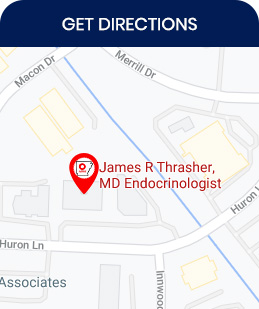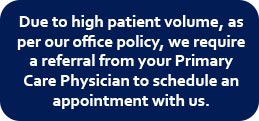How High Blood Sugar Symptoms Can Affect Your Health
High blood sugar symptoms can often be subtle at first but may lead to serious health complications if ignored. Dr. James Thrasher of the Arkansas Diabetes and Endocrinology Center emphasizes the importance of recognizing early signs like fatigue, frequent urination, and blurred vision. These symptoms can affect your daily life and long-term health if left untreated. For more information, contact us for an appointment online. We are conveniently located at 11400 Huron Lane, Little Rock, AR 72211.


Table of Contents:
How can high blood sugar affect your energy levels?
What are the long-term effects of untreated high blood sugar?
How does high blood sugar affect your cardiovascular health?
How can I manage high blood sugar symptoms to protect my health?
How do the providers at Arkansas Diabetes and Endocrinology Center help patients manage high blood sugar symptoms effectively?
When your blood sugar is too high, your body cannot use glucose efficiently for fuel. This happens either because there isn’t enough insulin or because your cells are resistant to insulin—a common issue for people with diabetes and other endocrine disorders. As a result, glucose remains in your bloodstream instead of entering your cells, which need it for energy. Even though there is plenty of sugar in your blood, your muscles and organs are starved for the energy they need to function properly.
Many patients at our center report experiencing fatigue or a constant feeling of tiredness when their blood sugar is high. This is caused by the lack of energy available to your body’s cells. In addition, high blood sugar can lead to dehydration, as your body tries to eliminate excess sugar by increasing urination. Losing fluids can leave you feeling even more tired and weak. Over time, consistently high blood sugar can also disrupt your sleep, further reducing your energy during the day.
If you are noticing unexplained fatigue, increased thirst, or changes in your sleep patterns, it may be related to your blood sugar levels. Our team at Arkansas Diabetes and Endocrinology Center specializes in diagnosing and managing these symptoms. We are here to help you find effective treatment options so you can feel your best every day.
At Arkansas Diabetes and Endocrinology Center, we understand the critical importance of managing high blood sugar to prevent serious health complications. Untreated high blood sugar, known as hyperglycemia, can have severe long-term effects on the body. Over time, consistently elevated blood sugar damages blood vessels and nerves, increasing the risk of complications that can impact nearly every organ system.
One of the most significant dangers is the heightened risk of cardiovascular disease, including heart attack and stroke, due to arterial damage. High blood sugar also places stress on the kidneys, potentially leading to chronic kidney disease or even kidney failure. The eyes are particularly vulnerable; uncontrolled diabetes can result in diabetic retinopathy, which may cause vision loss or blindness if not addressed early.
Nerve damage, or diabetic neuropathy, is another frequent complication. This often begins with tingling, pain, or numbness in the hands and feet and can progress to more serious issues such as digestive problems or sexual dysfunction. Additionally, high blood sugar impairs circulation and the immune system, making it harder for the body to fight infections and heal wounds. This puts the feet at increased risk for ulcers and infections, which in severe cases may necessitate amputation.
We understand the critical connection between high blood sugar (hyperglycemia) and cardiovascular health. Our team is dedicated to helping Arkansans manage diabetes and endocrine disorders to prevent the serious complications that can arise from elevated blood sugar.
When blood sugar remains high over time, it can damage blood vessels and the nerves that regulate your heart. This damage can accelerate the buildup of fatty deposits in the arteries—a process called atherosclerosis—which restricts blood flow to your heart and other organs. In addition, persistent hyperglycemia promotes inflammation in the body, further increasing your risk for high blood pressure and other cardiovascular issues.
If left unmanaged, these changes can lead to life-threatening events such as heart attacks, strokes, and heart failure. Diabetes also increases your likelihood of developing other risk factors for heart disease, including abnormal cholesterol levels and obesity.
At Arkansas Diabetes and Endocrinology Center, we focus on comprehensive diabetes management and cardiovascular risk reduction. Our expert providers work with you to develop personalized plans that include:
● Blood sugar monitoring and management
● Nutritional counseling
● Physical activity guidance
● Medication management when necessary
● Regular screenings for cardiovascular risk factors
We are committed to helping you maintain healthy blood sugar levels to protect your heart and overall well-being. If you have concerns about your blood sugar or cardiovascular health, schedule an appointment with us today. Together, we can help you live a healthier, longer life.
At Arkansas Diabetes and Endocrinology Center, we understand how crucial it is to manage high blood sugar in protecting your overall health, especially if you have diabetes or are at risk for developing it. Our team is dedicated to supporting you every step of the way.
● Regular Monitoring
One of the most important steps is to monitor your blood glucose levels as recommended by our provider. Tracking your numbers helps you and your care team identify patterns or spikes, allowing for timely adjustments to your care plan.
● Healthy Eating
Our specialists often emphasize the value of a balanced diet. Focus on whole grains, lean proteins, healthy fats, and non-starchy vegetables. Try to limit processed foods, sugary snacks, and sweetened beverages. Portion control is also key, as large meals can cause blood sugar to rise quickly. Our team can help you develop a personalized meal plan that fits your needs.
● Stay Active
Physical activity helps your body use insulin more effectively. Whether it’s walking, cycling, or swimming, try to stay active most days of the week. Ask our providers for guidance on safe and effective exercise routines tailored to your health status.
● Medication Management
If you’re prescribed medications for diabetes, it’s important to follow your provider’s instructions carefully. Do not skip doses, and let us know if you have any questions or concerns about your medications.
At Arkansas Diabetes and Endocrinology Center, our team of experienced endocrinologists and healthcare professionals is dedicated to providing comprehensive, patient centered care for individuals struggling with high blood sugar and related endocrine conditions. Our approach begins with a thorough assessment of each patient’s medical history, lifestyle, and current symptoms to gain a complete understanding of their unique needs.
Using this information, we create personalized treatment plans tailored to each individual. Our services may include medication management, customized dietary guidance from certified diabetes educators, and recommendations for appropriate physical activity. We place a strong emphasis on patient education, teaching our patients how to monitor their blood sugar levels accurately and recognize the early signs and symptoms of hyperglycemia.
To ensure optimal results, we schedule regular follow-up appointments where we track progress, review blood sugar logs, and make any necessary adjustments to the treatment plan. Our team is always available to address questions or concerns, offering ongoing support every step of the way. In addition, we connect our patients with up-to-date diabetes education resources and support services to empower them to make informed decisions about their health.
For more information, contact us for an appointment online. We are conveniently located at 11400 Huron Lane, Little Rock, AR 72211. We serve patients from Little Rock AR, Conway AR, North Little Rock AR, Pine Bluff AR, Hot Springs AR, Benton AR, Sherwood AR, Russellville AR, Jacksonville AR, Cabot AR, Searcy AR, Bryant AR, Jonesboro AR, Forrest City AR, Magnolia AR, Camden AR, Malvern AR, Batesville AR, Arkadelphia AR, Clarksville AR, Monticello AR, Heber Springs AR, Morrilton AR, Stuttgart AR, Greenbrier AR, Sheridan AR and Vilonia AR.







